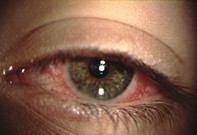Peer Reviewed
Feature Article Ophthalmology
Steroids and the eye
Abstract
Corticosteroids are extremely valuable medications because of their potent ability to treat inflammatory, immune-mediated or allergic conditions. However, their therapeutic potential in ophthalmology is often limited by their numerous side effects. Also, the rapid symptom relief they produce can mask their adverse effects.
Key Points
- The correct use of corticosteroids for ophthalmic conditions can be sight saving; their incorrect use is potentially blinding.
- Corticosteroids should never be given for an undiagnosed red eye, when visual acuity is impaired or if there is a history of ocular herpes infection.
- Corticosteroids should be prescribed only when indicated, not casually for the relief of ocular discomfort.
- Topical corticosteroid treatment should not be repeated or renewed without regular review by an ophthalmologist.
- Patients on prolonged systemic corticosteroids should have six-monthly eye examinations by an ophthalmologist.
- Paediatric patients on corticosteroids require careful ophthalmological monitoring.
Purchase the PDF version of this article
Already a subscriber? Login here.

